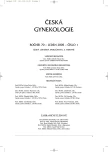-
Medical journals
- Career
Abdominal hysterectomy – Risk Factor in Development of Urinary Incontinence? Results of a Questionnaire Study
Authors: Roman Chmel; Marta Nováčková; Zlatko Pastor; R. Vlk; L. Horčička; M. Pluta; Lukáš Rob
Authors‘ workplace: Gynekologicko-porodnická klinika 2. LF UK a FN Motol, Praha, přednosta doc. MUDr. L. Rob, CSc.
Published in: Ceska Gynekol 2005; 70(1): 53-56
Category: Original Article
Overview
Objective:
To evaluate the risk of urinary incontinence development after abdominal hysterectomy for benign gynecological disease.Design:
Retrospective questionnaire study.Setting:
Obstetrics and Gynecology Department, Charles University 2nd Medical Faculty and Teaching Hospital Motol, Prague.Methods:
Questionnaire study of women in which abdominal hysterectomy for benign gynecological disease was performed from January till December 2001 at our Department of Gynecology and Obstetrics. The questionnaire included questions about symptoms of stress, urge and mixed urinary incontinence. They were evaluated in connection with age, parity, hormonal status and body mass index. Student t-test was used for the statistical analysis.Results:
114 (59.7 %) from all sent-out questionnaires were obtained. In 15.8 % cases (18 from 114) de novo urinary incontinence after surgery developed. 77.8 % (14 from 18) from these patients suffered from gennuine stress incontinence. The rest (4 from 18) of the women had symptoms of mixed incontinence. Study results draw attention to 13.1 % women (15 from 114) in which preoperative stress incontinence persisted even after hysterectomy. Preoperative stress incontinence was cured in 6.1 % (7 from 114) cases after hysterectomy. Age, parity, hormonal status and body mass index were not statistically different in all groups after surgery.Conclusions:
The results of the study show relatively high risk of urinary incontinence development after abdominal hysterectomy in previously continent women. The results also show high persistence of the stress incontinence symptoms in women who did not inform about their incontinence even if they were asked about it. Higher quality of further health education of the women with drawing their attention to both the possibility of surgical treatment of urinary incontinence simultaneously with hysterectomy are the most important aspects how to make the current gynecological surgical therapy more effective.Key words:
female urinary incontinence, abdominal hysterectomy, questionnaire
Labels
Paediatric gynaecology Gynaecology and obstetrics Reproduction medicine
Article was published inCzech Gynaecology

2005 Issue 1-
All articles in this issue
- New Options in Pharmacological Treatment of Urge Urinary Incontinence in Women
- Importance of Registry of Aggregated Data on Women Giving Birth
- Analysis of Maternal Mortality in the Czech Republic in 2001
- Analysis of Present Diagnostic Methods of Intrapartal Fetal Hypoxia
- Contribution of Doppler Examination in Pregnancy at Risk of Alloimune Fetus Anemia
- Risk Factors of the 3rd and 4th Degree Tear during Delivery
- Birth Defects in the Czech Republic – Expected Incidence in the Coming Years
- Pelvic Exenteration
- Possibilities of Increased Radicality in Pelvic Exenteration
- Abdominal hysterectomy – Risk Factor in Development of Urinary Incontinence? Results of a Questionnaire Study
- MMP-26 mRNA and Estrogen Receptor Alpha Co-expression in Normal and Pathological Endometrium
- Protein bcl-2 Expression in the Mid-secretory Endometrium after Oral Estrogen-Progesterone Preparation
- Syndrome of Pseudomyxoma Peritonei – Description of Three Cases and Survey of the Problem
- Cystic Hypersecretory Carcinoma: Rare and Potentially Aggressive Variant of Intraductal Carcinoma of the Breast. Report of Five Cases
- Czech Gynaecology
- Journal archive
- Current issue
- Online only
- About the journal
Most read in this issue- Abdominal hysterectomy – Risk Factor in Development of Urinary Incontinence? Results of a Questionnaire Study
- Risk Factors of the 3rd and 4th Degree Tear during Delivery
- Syndrome of Pseudomyxoma Peritonei – Description of Three Cases and Survey of the Problem
- Contribution of Doppler Examination in Pregnancy at Risk of Alloimune Fetus Anemia
Login#ADS_BOTTOM_SCRIPTS#Forgotten passwordEnter the email address that you registered with. We will send you instructions on how to set a new password.
- Career

